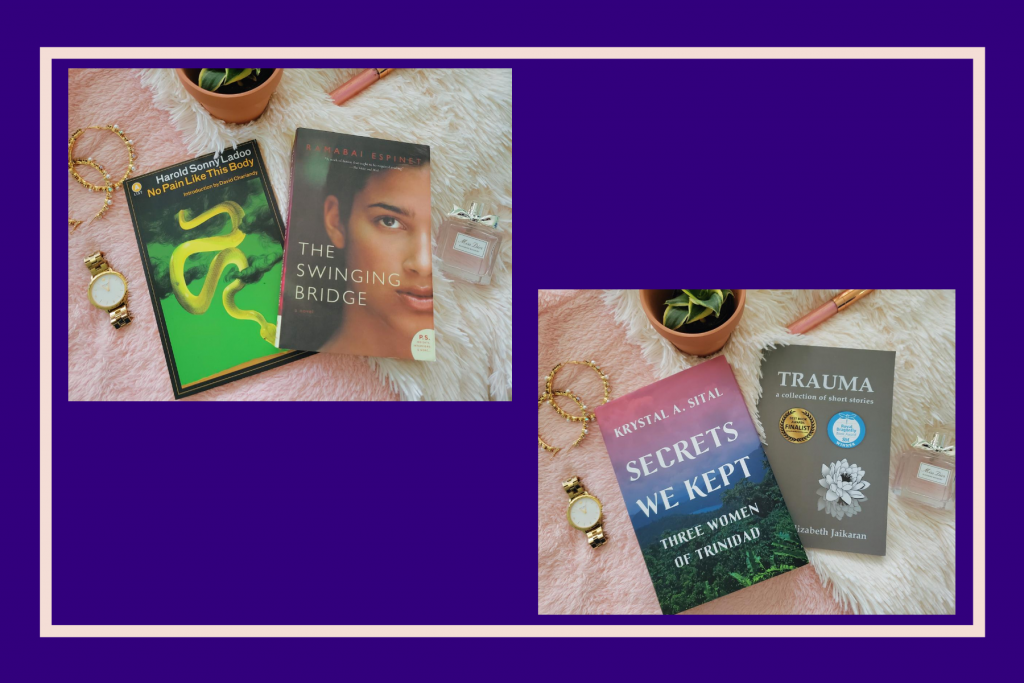
*Content Note: mentions of domestic violence and violence against women
Literature has always held a special power. It provides insights on cultures and history, voices to those with stories and resources to those in search of information. As a first-generation Canadian of Indo-Caribbean heritage, books about my people have helped me gain a significant understanding of them—particularly the obstacles and trauma they have faced.
While I’ve always been eager to pick up a new book by an Indo-Caribbean author, the trends of trauma in our stories, specifically the trauma faced by women, have left me with feelings of anguish. Books such as “Secrets We Kept: Three Women of Trinidad” by Krystal A. Sital and “Trauma: A Collection of Short Stories” by Elizabeth Jaikaran are specifically about the abuse Indo-Caribbean women have faced.
Things such as domestic violence, rape and alcoholism are carefully explored in the narratives of these books. What hurts most is that these stories are taken from the real lives of women in both author’s families. These women exist. Their stories are real and they have lived through each of the brutal events that are described.
View this post on Instagram
After reading each book, I found myself needing to pause and reflect. I have been privileged to not face these things in my own life, but understanding that this is a reality for many women in my community lingers in my mind. I try to put myself in their shoes, try to imagine what would provoke a man to treat a woman in the ways I read about. I think about how these mothers put on brave faces to protect their children, how they powered through each day, carrying the weight of their pain and kept living despite the fear of another beating. They were all expected to be docile, silent and continue their duties as if all of these events were normal. These things stayed behind closed doors for decades.
I’ve tried to look at things from the male perspective as well. Indo-Caribbean men often hold such a negative reputation of being alcoholics and abusers. I recall hearing these things even in my own family. To someone who isn’t familiar with Indo-Caribbean culture, reading some of these stories might further imprint these stereotypes and give the impression this is what all of our men are like.
[Read Related: Indo-Caribbean Author Krystal Sital Gets Personal in ‘Secrets We Kept’]
In “The Swinging Bridge” by Ramabai Espinet and “No Pain Like This Body” by Harold Sonny Ladoo, the characters also deal with abuse in their childhood at the hands of their fathers. Again, the abuse often took place under the influence of alcohol. While these were fictional stories, some events were based on reality. It felt like another strike against our men, another tale that described more negative behavior.
I had to understand that despite the uneasiness these stories brought me, the fact that these experiences had made it into books was a win for every woman that has ever faced abuse and mistreatment. Topics surrounding women’s oppression are taboo for decades, swept under the rug and treated as if they never existed. Bringing them to light is more important than ever and literature continues to hold space for this.
We can share books, speak about them, write about them and continue sending their messages into different streams. We can raise awareness and allow our communities to address trauma and facilitate healing. I imagine these authors had similar goals in mind when choosing to tell the stories they did.
View this post on Instagram
While the books I read have given me a look into Indo-Caribbean trauma, I still don’t have all the answers. I can’t understand what could possibly provoke someone to become so angry that they turn violent. I don’t understand what would make a man want to hurt his wife, daughter or even a random woman on the street. I’ve yet to read something that gives me the perspective of an abuser or former abuser, but I feel this is a missing piece to the puzzle. We need that side of the story in order to create real change and do better in the future. Negative behavior stems from somewhere and perhaps that’s a different set of trauma that certain men have yet to release.
[Read Related: 3 Indo-Caribbean Mental Health Counselors Talk About Community’s Stigma]
Until such time, I commend every author and person who has had the courage to share their stories. We can’t deny that trauma and abuse plague our community and it’s only natural it would bleed into our stories. As the younger generation, it’s important we understand where these stories stem from and why. It’s important we sympathize with our mothers, aunts and grandmothers, and give them the comfort and space to share their experience. I’m confident that through books like “Secrets We Kept and Trauma,” Indo-Caribbean women have been inspired to have conversations and go to places they may not have dared to.
While I continue to grieve for the lionhearted souls in my books, their braved pains certainly haven’t gone unnoticed. Their voices have helped us strive for brighter days and improve the future based on the faults of the past. I am indebted to my foremothers and thankful that the power of literature has continued to shine.




